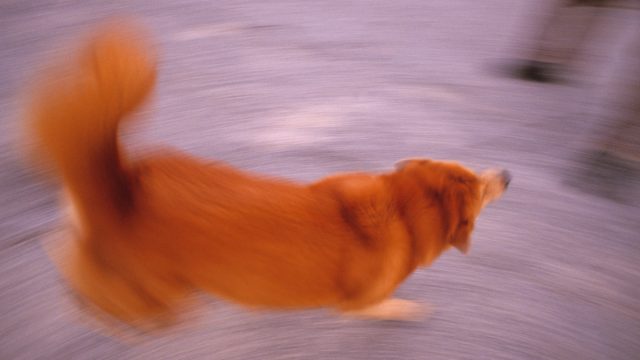Here's Why Your Dog Is Really Spinning in Circles, According to Experts
It could be hereditary or it may be the sign of a medical issue.
Most dog parents have seen their pooch spin around in a circle at least once or twice. We usually chalk it up to our pet being silly, and we think it's cute, maybe even taking a video of the funny behavior. But when this starts occurring frequently, you might find yourself wondering if it's something to be concerned about. According to veterinarians and pet experts, the answer is maybe. It could be that your four-legged friend gets themselves dizzy as an inherited habit—or it could be the sign of an underlying health problem. Read on to learn the real reason your dog is spinning in circles and when you should seek out a vet's help.
READ THIS NEXT: The 7 Best Dogs for Beginners, Vets Say.
This is the simplest explanation.
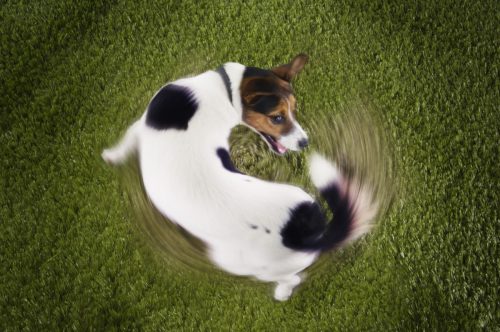
The scientific term for an animal spinning in circles is frenetic random activity periods (FRAPs), according to Bethany Tate, managing editor at Whole Pet Health. Colloquially, the behavior is known as the "zoomies," and it's the result of a buildup of excess energy. Daniel Caughill, a co-founder of The Dog Tale, explains that dogs "may spin in tight rapid circles along with running or jumping."
So, it makes sense that your dog would start spinning when you've just gotten home from work or when they're about to be fed. If you keep your dog in a crate at times, the zoomies may definitely ensue when they get out.
They might be being obedient.
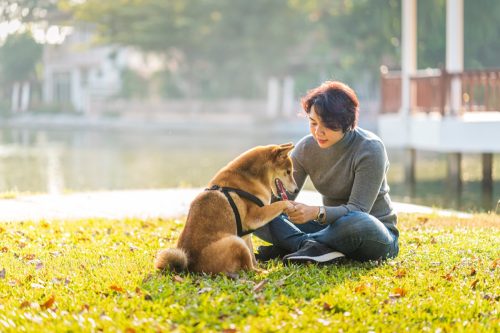
Instead of having a dog sit or give their paw, certain trainers will teach the animal to spin as a trick, according to Nicole Ellis, a certified professional dog trainer and pet lifestyle expert with Rover. "And when dogs are excited and they want food, or they want a treat, the first thing these dogs often offer is a spinning circle."
READ THIS NEXT: If Your Dog Is Playing With This, Take it Away Immediately.
It could be a bedtime ritual.
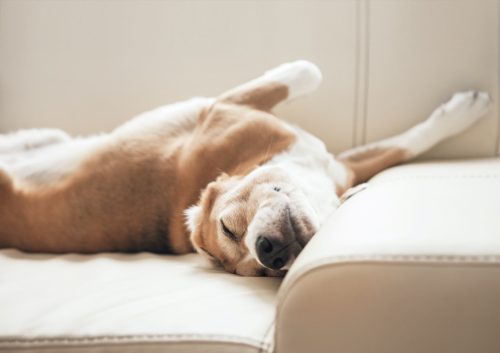
According to Jennifer Bruns, DVM, MPVM at PetSmart, many dogs will circle before going to sleep as an inherited genetic behavior. "Wolves and other wild canines will often spin before finding their sleeping position to observe their surroundings and pick up on any threatening scents. While our pups may not encounter the same threats as their wild ancestors, the instinct remains."
Christian Kjaer, CEO and co-founder of ElleVet Sciences, notes that part of this inherited practice is also because they want to release their scent. "If your dog has a bed, they may spin in circles before lying down to release an aroma that acts as an alert to other dogs that their bed is indeed theirs." As long as they can quickly and comfortably get to sleep, this probably isn't cause for concern.
This is the weird reason for spinning in circles.
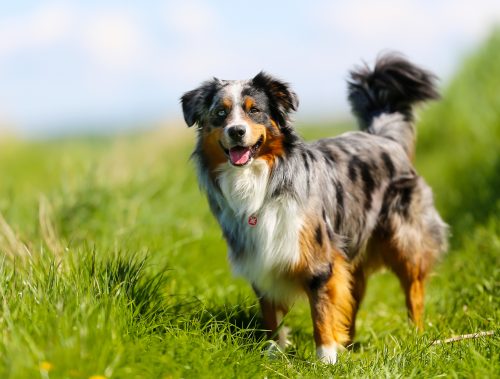
Perhaps the weirdest reason your dog gets the zoomies is that they need to go to the bathroom. Like setting up for sleep, dogs' tendency to circle before a bowel movement is an inherited behavior. "They have retained the 360-degree movement of their ancestors, who lived in the wild. It was a smart way to survey the surroundings for safety, before squatting down. Dogs were able to sniff for possible predators and avoid any surprise attacks while being in a vulnerable position," explains Richard West, founder of PuppyHero.
West also notes that this movement can help activate their bowels when they feel the urge. Though this is generally harmless, if it seems like your pet is uncomfortable, "you can take your dog for a walk whenever you feel like it's time for them to poop," he says.
Your dog may be anxious.
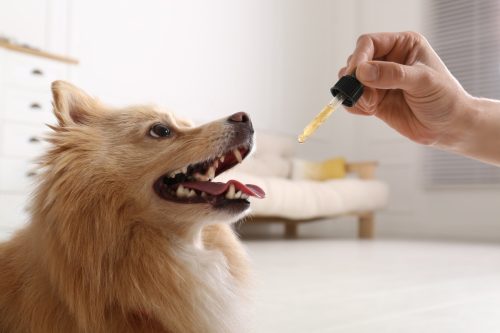
Just as spinning could be an emotional reaction to excitement, it could also be due to your dog feeling frustrated, stressed, or scared. "I know a dog that was in a shelter for years and when he is stressed, he goes back to that crate spinning," notes Ellis.
In more serious cases, this stress-induced behavior can turn into Canine Compulsive Disorder, according to Courtnye Jackson, a veterinarian and founder of The Pets Digest. "It is described much the same as OCD in humans and is defined as dogs that have repetitive behaviors occurring out of context." She says that two such behaviors are tail chasing and/or circling. If this is the case, pet owners can speak to a behaviorist to reduce stress levels. This professional can also prescribe certain medications if the distress is unmanageable.
For more pet advice delivered straight to your inbox, sign up for our daily newsletter.
It could be more serious.
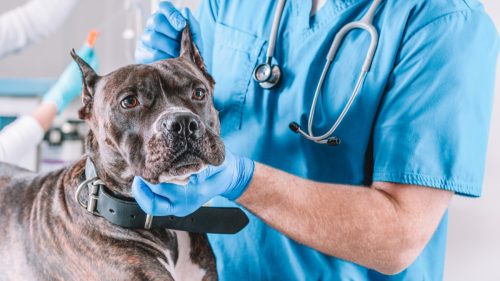
If the behavior becomes persistent and doesn't seem to be tied to anxiety, you may need to look into it further. "If a dog develops a circling habit and seems confused or unable to stop, it's worth taking a trip to the veterinarian," explains Josh Snead, CEO of Rainwalk Pet Insurance. "Circling can also indicate deeper conditions like an inner ear infection or even a stroke."
If you notice your dog rubbing their head while spinning, Ellis says it could indicate an ear infection. She also notes that a "potential neurological-related explanation for your dog exhibiting circling behavior is seizures." In these serious cases, you may also see "uncontrolled twitching and bathroom accidents, loss of consciousness or inability to focus, sudden falling, biting and drooling."
With senior dogs, circling can be a symptom of three common yet serious medical issues. Ellis says the first is Vestibular Disease. "This disease affects the vestibular system which is responsible for balance and is basically comprised of the inner ear, brain stem, and certain parts of the brain. In addition to tight circling, nystagmus (flickering of the eyes in different directions), and falling, leaning, or head tilting are also symptoms."
Cushing's Disease, "which is the result of excess hormones related to the pituitary and adrenal glands," is another common cause in older animals, according to Ellis. She says this will usually cause changes in behavior including "pacing and circling, as well as loss of hair, weakness, and an excess of appetite, thirst, and urination." Finally, Ellis says senior dogs could be experiencing Canine Cognitive Dysfunction (dog Dementia).
Whether you think it's serious or not, if your dog begins circling more than normal, to excess, or out of nowhere, it's important to see a vet and rule out any serious medical issues.
